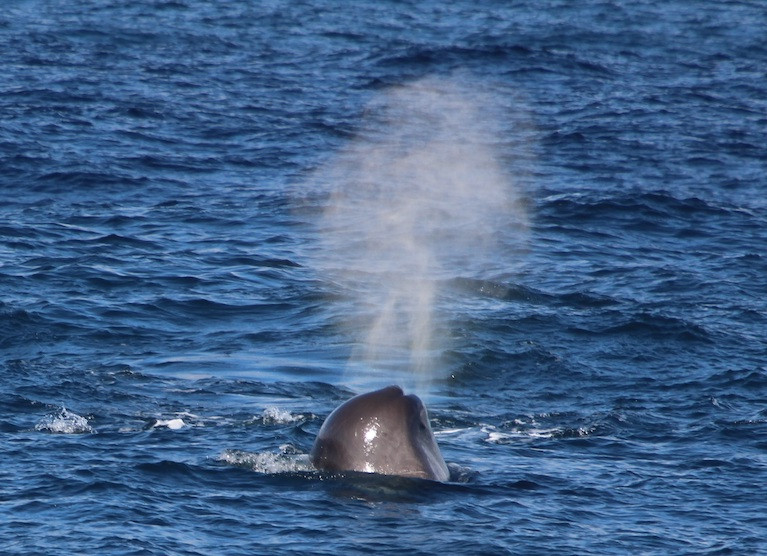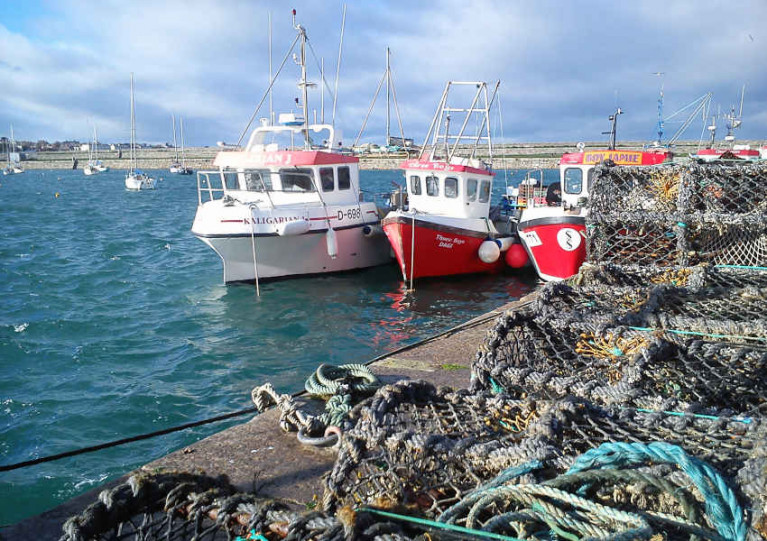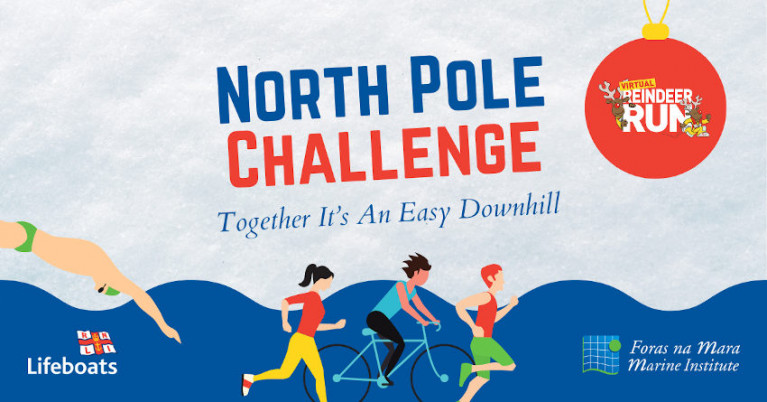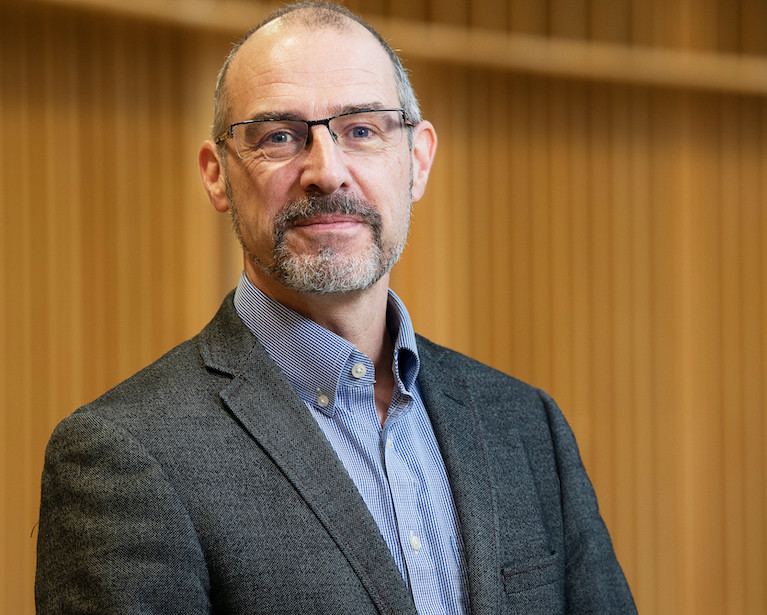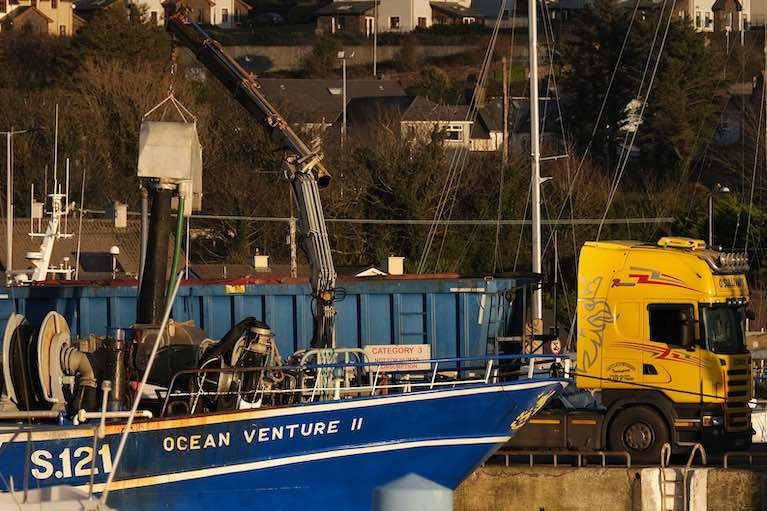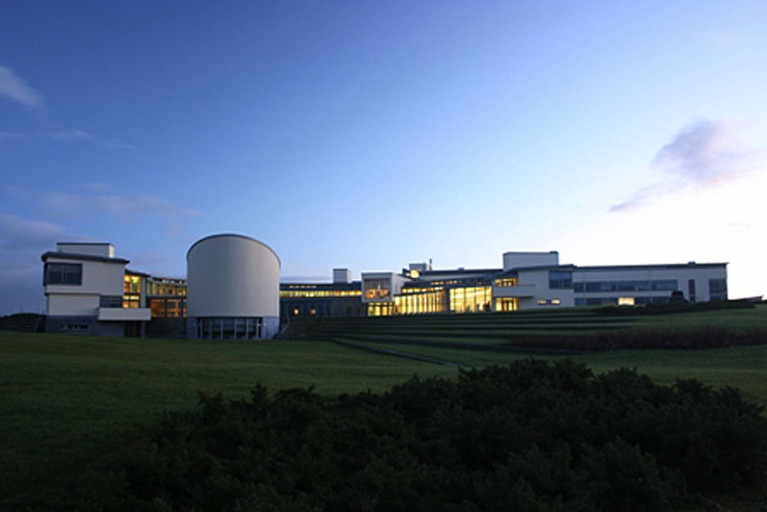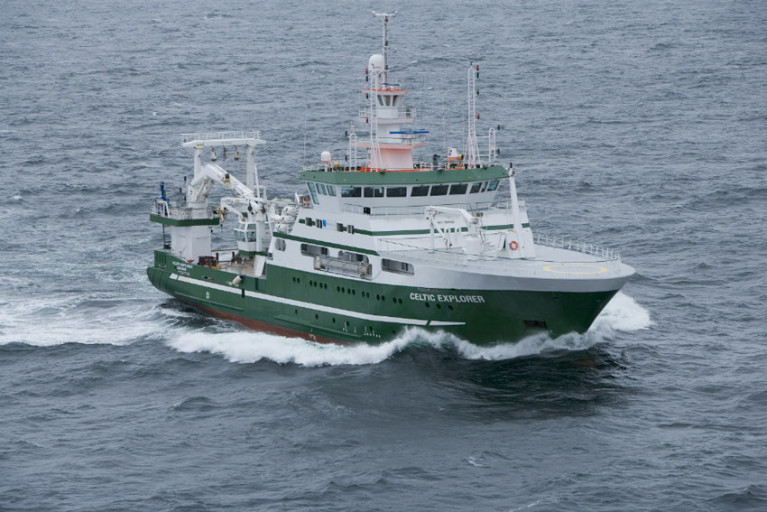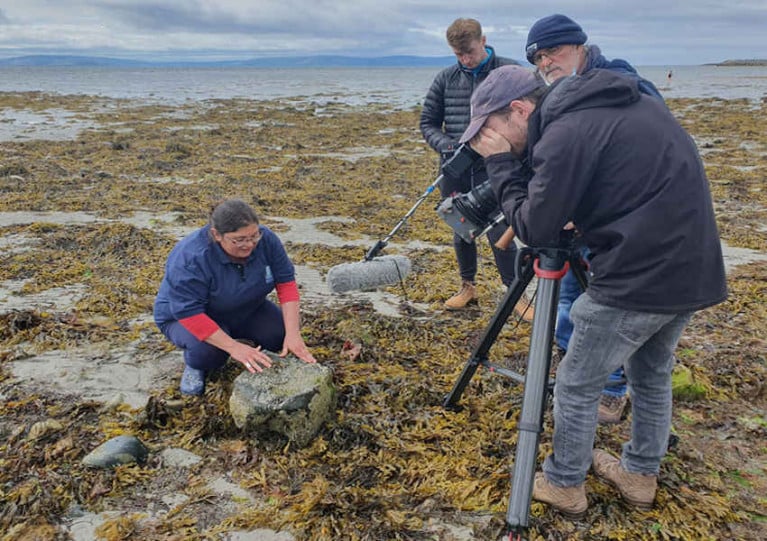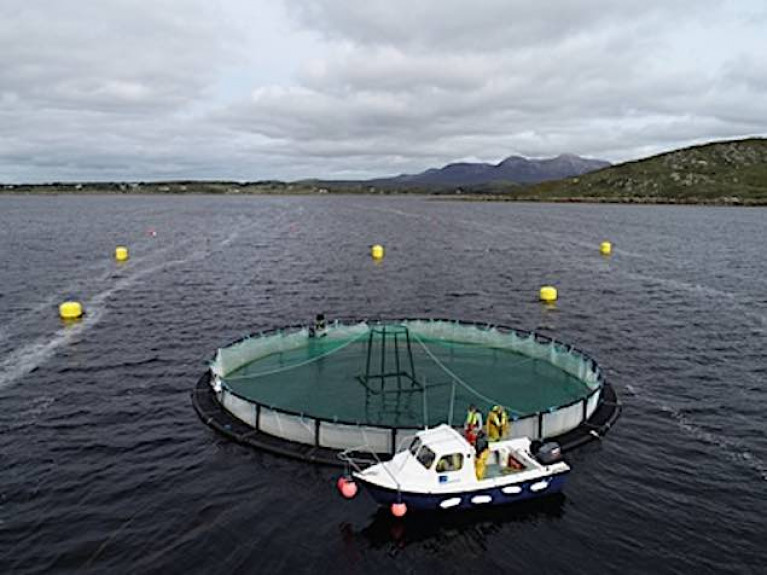Displaying items by tag: Marine Institute
High Numbers of Sperm Whales Counted off Irish West Coast in New Study
Up to 380 sperm whales are living in deep waters off the Irish coast, a newly published study has found.
This makes sperm whales “one of the most abundant great whale species” in these waters, expert Dr Simon Berrow says.
Sperm whales are known for their distinctive echolocation “clicks” which can be heard over many tens of kilometres, and this allows them to be counted.
A survey team from Galway-Mayo Institute of Technology (GMIT) and the Scottish Sea Mammal Research Unit (SMRU) Consulting spent 45 days at sea in harsh weather conditions to conduct the population count.
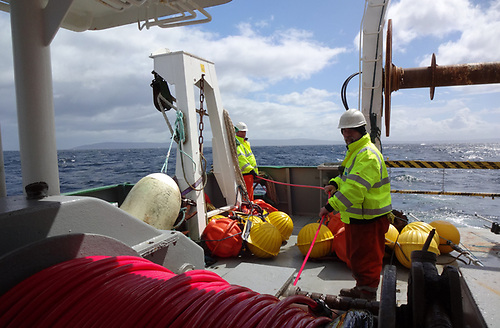 Deploying towed hydrophone from RV Celtic Voyager Photo: Simon Berrow
Deploying towed hydrophone from RV Celtic Voyager Photo: Simon Berrow
“With high sea states and towering swell, the study relied purely on being able to detect the distinctive powerful click trains of sperm whales using a streamlined towed hydrophone or underwater microphone array,” Dr Berrow said.
The results were published recently in the Journal of Cetacean Research and Management, following detailed sea surveys dating back to 2015.
Dr Berrow, the principal investigator on the study, noted that the deep-diving tendency of sperm whales makes them difficult to observe at sea – they can spend nearly an hour in depths below 300m.
Only 11 individuals were sighted during 388 hours of effort, he said, but 391 acoustic detections were recorded.
 Sperm whales off Ireland’s west coast Photo: Irish Maritime Squadron
Sperm whales off Ireland’s west coast Photo: Irish Maritime Squadron
“Each whale was pinpointed by comparing the exact time that each click arrived at each hydrophone in the array and then triangulating bearings from sequential clicks over extended encounters,” he said.
The whales seemed to prefer seabed areas that sloped to the northwest, including the Erris and Rockall Basins.
There was also a dense concentration of sperm whales in the South Brona Basin canyon system near 350km west of Co Kerry
The surveys were carried out from the Marine Institute’s RV Celtic Voyager and the yacht Song of the Whale, operated by Marine Conservation Research Ltd.
The study was part of the ObSERVE-Acoustic project funded by the Department of Communications, Climate Action and the Environment and the National Parks and Wildlife Service.
More here
New Technologies May Help Fishing Skippers Avoid Unwanted Catches
Scientists at the Marine Institute are investigating how new technologies could be used to share real-time information and help fishing skippers avoid unwanted catches.
The IFISH (Irish Fisheries Information Sharing Network Development) project, funded by the Science Foundation Ireland, is encouraging fishers to participate and assist in developing a useful information-sharing tool for the industry.
New technology is increasingly being used to assist skippers avoid unwanted catches, but is yet to be used in Irish fisheries.
Co-operative schemes and mobile phone applications are being developed in fisheries across the world from the USA to Scotland, to help skippers receive up to date information on the location of fish, to assist in avoiding juvenile or quota limited species.
The new BATmap app, for example, is being trialed by Scottish fishers to help avoid choke species in west of Scotland fisheries.
IFISH will build on the research conducted as part of the DiscardLess project, which resulted in the development of a discard hotspot mapping app.
The project will move beyond producing static maps of fish distributions based on historic catch patterns and look at how information sharing among the Irish fleet could help provide real-time information on the location of fish that fishers don’t want to catch, such as undersize juveniles.
Julia Calderwood, scientist at the Marine Institute, said: “At this early stage of the project, we are really keen to talk to anyone who is willing to share their experiences and opinions on how effective different fishing tactics are at avoiding unwanted catches, as well as how sharing information on the location of unwanted catches may potentially help in further avoiding them.”
Industry involvement in the IFISH project is key to help co-design information sharing tools and ensure they are developed to assist in avoiding problematic catches, whatever they may be locally or within particular fisheries.
By working with partners in a number of different fisheries, it will also be possible to set up separate information sharing networks in different fisheries or regions, rather than taking a broad approach.
“Industry input is really important to help shape this research so that we can ensure that we are addressing industry needs and concerns and to ensure any output from this work is useful and relevant,” Calderwood added.
The use of any developed tools will be completely voluntary, with skippers only taking part if they feel it would be useful, and all information shared would be private and only available to skippers using the tool.
For more information or to participate in the IFISH project, contact Julia Calderwood at [email protected]
Join in with Marine Institute Staff on Virtual Festive North Pole Trek in Aid of RNLI
Staff at the Marine Institute are attempting to walk, run, row, cycle and swim the 4,068km distance from their headquarters in Galway to the North Pole in aid of the RNLI.
And they’re inviting everyone to join in and support their virtual festive fundraising challenge, which runs until Friday 18 December.
“Many of our colleagues and those that we work with spend much of their time at sea,” says Marine Institute chief executive Dr Paul Connolly. “Knowing that the emergency services are there should we need them is a huge comfort for all who use the ocean whether for work or for pleasure.
“This year has been difficult for many and especially hard also for charities such as RNLI Lifeboats Ireland. For these reasons, as an organisation the Marine Institute decided that together we could do our bit to support the RNLI and have a bit of festive fun while we are at it.”
It costs the RNLI €1,650 to train a volunteer lifeboat crew member for a year, and €1,764 to kit them out in their lifesaving gear — so every euro raised counts.
“We are asking the public to consider adding their kilometres to our fundraiser and making their steps or swims count. Together we can make this an easy downhill and raise much needed funds for RNLI lifeboats,” Dr Connolly adds.
If you want to take part, commit some kilometres to the 4,000km total or choose to donate. And don’t forget to post your challenge photos on social media, tagging the Marine Institute on Twitter or Facebook and using the hashtag #NorthPoleChallenge
Marine Institute Appoints Two Directors
The Marine Institute has announced the appointment of two Directors to the state agency’s Senior Leadership Team. Dr Ciaran Kelly has been appointed Director of Fisheries Ecosystems Advisory Services and Joe Silke to the position of Director of Marine Environment and Food Safety Services.
Dr Paul Connolly, CEO of the Marine Institute said, “I congratulate Dr Ciaran Kelly and Joe Silke on their appointments to the Marine Institute’s Senior Leadership Team. Both Ciaran and Joe bring a wealth of experience and knowledge to these roles, and will lead our people in undertaking innovative research and providing a range of monitoring, scientific and technical services to government, agencies and industry.”
The Marine Institute’s Fisheries Ecosystems Advisory Services team research, assess and advise on the sustainable exploitation of Ireland’s fisheries resource and marine ecosystems.
 Director of Marine Environment and Food Safety Services, Joe Silke Photo: Andrew Downes
Director of Marine Environment and Food Safety Services, Joe Silke Photo: Andrew Downes
Dr Ciaran Kelly graduated from Trinity College Dublin with a degree in marine biology and a PhD in Fisheries Science from University College Dublin. Starting as a researcher on commercial deep water fish species on trawlers out of Killybegs, Ciaran has gone on to lead the acoustic survey and pelagic assessment teams at the Marine Institute, before managing the national Marine Research Funding Programme. He has been involved in advice provision to government managers and policy makers for over 20 years, playing a key role in the development of the Maximum Sustainable Yield advice framework and the development of advice for data limited stocks at the International Council for the Exploration of the Seas (ICES).
As the Director of Marine Environment and Food Safety Services, Joe Silke will lead the team responsible for scientific services to government in support of evidence-based policy advice and to meet objectives for safe seafood, sustainable development of the marine environment and fish health.
Joe studied in Galway Mayo Institute of Technology and in Trinity College Dublin where he qualified with a Master’s Degree in Environmental Science. His career originated in the aquaculture industry where he worked in shellfish hatcheries and on-growing facilities, and innovative production methods through the 1980s. He then moved into research activities in phytoplankton and oceanography, and carried out several projects in the field of marine aquaculture development and environmental surveying. Joe has served on several international working groups and is the current Chair of the Intergovernmental Oceanographic Commission of UNESCO (IOC) Panel on Harmful Algal Blooms.
The Marine Institute is the State agency responsible for marine research, technology development and innovation in Ireland. The Marine Institute carries out environmental, fisheries, and aquaculture surveys and monitoring programmes to meet Ireland's national and international legal requirements. The Institute also provides scientific and technical advice to Government to help inform policy and to support the sustainable development of Ireland's marine resource.
The Marine Institute aims to safeguard Ireland's unique marine heritage through research and environmental monitoring. Its research, strategic funding programmes, and national marine research platforms support the development of Ireland's maritime economy.
"Astonishing" Abundance of Warm Water Anchovies off South Coast - Marine Institute Says it is "aware" of Situation
Sea temperatures may seem bracing for swimmers, but shoals of warm water anchovies have appeared in large numbers off the south-west coast.
“Astonishing” is how Kerry-based fish expert Dr Kevin Flannery describes the volume of tiny oily fish, widely used in Mediterranean cooking.
Flannery estimates that at least 1,000 tonnes of anchovies has been landed into south-west harbours over the past week by a number of Irish vessels fishing in Dingle Bay and off the Cork coast.
 A truck waiting to take tonnes of warm water anchovies caught by Irish vessels in Dingle Bay for fish meal. Photo: Nick Massett
A truck waiting to take tonnes of warm water anchovies caught by Irish vessels in Dingle Bay for fish meal. Photo: Nick Massett
Small numbers of anchovies have been identified in Irish waters before, with the first record being off Ventry, Co Kerry, in 1870. The fish also appeared off Crookhaven, Co Cork last January.
“We thought of them as vagrants, whereas this past week has seen astonishing numbers,” Flannery said.
“There is an urgent need for the Marine Institute to analyse this and establish if it is a permanent trend, where perhaps the anchovies are displacing herring,” he said.
“There is also an urgent need for Bord Bia to develop markets for Irish boats catching these fish because at the moment there is no market and trucks are taking them for fishmeal,” he said.
Peru has one of the world’s largest anchovy fisheries, and the popularity of the fish as a pizza topping, in salads and with olives has increased the value of the catch.
EU quotas for anchovies have been set for Atlantic areas, mainly in the Bay of Biscay and west of Portugal, and there is no quota in Irish waters –making it an open fishery, according to the State’s Sea Fisheries Protection Authority (SFPA).
“The SFPA is aware of the presence of these vessels in the Dingle area and is monitoring their activities in line with relevant regulations,” it said.
The Marine Institute said that it was aware of anchovies appearing in these waters in small numbers since 2003, and picked them up as part of its periodic groundfish surveys.
However, it said there was no evidence to date of abundance, or of spawning in Irish waters.
The Irish Whale and Dolphin Group noted that sending the catches for fish meal was a “poor use of forage fish”.
The Irish South and West Fish Producers’ Organisation said it was “wonderful to see these fish returning to our shores, and will give a big needed boost to our fishermen after the terrible year they have suffered from storms and collapsing markets due to the Covid pandemic”.
Anchovy are a species with a “low vulnerability and high resilience and as such can sustain high levels of fishing pressure,” according to the Marine Conservation Society.
“Recruitment of young fish to the stock is affected by environmental factors including climatic fluctuations. If recruitment is low and fishing pressure too high the stock becomes vulnerable to collapse,” it says.
“Anchovy are also a species at or near the base of the food chain and the impact of their large-scale removal on the marine ecosystem is poorly understood,” it says.
Reports of 2000t of sprat and anchovies caught in Dingle Bay this week. Vessels >18m are back fishing these non-quota species, since the 6nmls ban was deemed void. Most went for fishmeal, a poor use of "forage fish", the link between primary producers and higher trophic levels. pic.twitter.com/2DKkx87V62
— Irish Whale and Dolphin Group (@IWDGnews) November 29, 2020
Waverider Buoy Deployment in Brandon Bay
Mariners in Brandon Bay in Co Kerry are advised of the Marine Institute’s deployment of a Waverider buoy over the coming days, subject to weather conditions.
The Waverider is a yellow spherical buoy, 1m in diameter ad equipped with an antenna and light at a height of approximately 2m. The light will flash yellow for five seconds every 20 seconds in hours of darkness.
The buoy is being deployed for 12 months in the centre of Brandon Bay (52 16.94 N, 010 05.69 W) by the Ocean Supporter (Callsign EITS6), which will display appropriate signals and lights.
More details can be found in Marine Notice No 55 of 2020, a PDF of which is available to download below.
New PhD Scholarship Awards Support the Next Generation of Marine Scientists
Seven new Cullen PhD scholarships have been awarded to run over the next four years, the Marine Institute has announced.
Established in 2014, the Cullen Scholarship Programme was named in memory of Anne Cullen (1958-2013), who made a significant contribution to the career development of many undergraduate students that have taken part in the Marine Institute’s annual summer bursary programme.
The programme provides research training opportunities for scientists in marine and related disciplines, leading to Master’s degrees and doctorates.
Students benefit from the academic support of their host institution of higher education, together with the practical training carried out using Marine Institute laboratory facilities, historical datasets and equipment, including access to the national marine research vessels.
Congratulating the latest award recipients, Marine Institute chief executive Dr Paul Connolly said: “Supporting the next generation of marine scientists enables Ireland to build our research and development capacity through excellent training and will provide scientific advice to stakeholders backed up by high quality peer-reviewed research.
“It also helps us to meet the important goals set out in the National Marine Research and Innovation Strategy.”
The seven projects awarded funds are:
- Biological changes in key commercially exploited fish in the light of Climate and Ocean Change – GMIT – €100,000
- Enhancing farmed Atlantic salmon quality through new production technologies – NUI Galway – €100,000
- Machine learning-assisted detection and prediction of climate change-related anomalous events in complex marine systems – GMIT – €100,000
- Improving fishing survey indices though the use of spatio-temporal models – GMIT – €100,000
- Seasonal to decadal sea level and ocean waves predictions through numerical modelling and statistical analysis – Maynooth University – €100,000
- Biodiversity conservation and restoration in the Wild Nephin Ballycroy National Park – GMIT – €100,000
- Ecology of Irish tunas – TCD – €100,000
Five of the scholarships will provide research findings that will be important in dealing with the effects of climate change on fisheries and marine systems.
The other two scholarships will investigate new production methods in the aquaculture sector, and the conservation of biodiversity in the Burrishoole Catchment in Newport, Co Mayo.
Students are expected to commence their projects in early 2021.
The latest funding of €700,000 adds to a total investment of €3.1 million in 34 scholarships — three MSc and 31 PhD — since the programme’s inception.
Two Master’s students have completed and five PhD students have successfully defended their thesis at viva, with a further eight students planning to submit their thesis in 2021.
Step Aboard the Celtic Explorer & More at Galway Science & Technology Virtual Festival
The Marine Institute and its Explorers Education Programme will once again be a part of the Galway Science and Technology Festival, which this year is a virtual experience for families on the weekend of 21-22 November.
Step aboard the Marine Institute’s marine science research vessel Celtic Explorer via a 90-minute livestream on Sunday 22 November from 11am to learn about some of its unique features, and why it is so important for fisheries research, climate studies and seabed mapping.
After the virtual show, jump aboard the RV Celtic Explorer and take a 3D virtual tour, or enjoy downloadable resources, videos and interactive activities that explore Ireland’s marine resource from the Oceans of Learning series.
And the weekend starts off with a trip to the seashore with the Explorers Education Programme team, who get ‘Wild about Wildlife’ as part of a special video series that’s been screened for schools this week as part of Science Week. Tune into the Galway Science & Technology Festival’s YouTube channel at 11am on Saturday 21 November (and again at 3pm on Sunday 22).
Marine Institute chief executive Dr Paul Connolly said: “The Marine Institute has supported the annual Galway Science and Technology Festival for many years, and is delighted to engage with parents and children through an online platform this year.
“The annual outreach event nurtures students’ interest and curiosity in science and technology subjects, and is also an opportunity for the Marine Institute, and our Explorers Education Programme, to raise awareness about the importance of our ocean and the work of our scientists.”
Meanwhile, the institute is also encouraging children to get creative and colour in a picture of the RV Celtic Explorer.
The winning entry will receive a LEGO City Ocean Exploration Submarine Deep Sea Set, and there are also two LEGO City Ocean Exploration Mini-Submarine Sets on offer.
To enter, download a copy of the colouring competition from the Marine Institute’s website, post a photo of your finished creation to social media and tag the institute on Twitter or Facebook. Winners will be announced on Friday 27 November.
Get Wild About Wildlife with the Explorers Education Team for Science Week
The Marine Institute’s Explorers Education Programme is interacting with children around Ireland among events for Science Week, which continues to this weekend.
Exploring the seashore will be the focus of the Explorers team as they share their Wild About Wildlife on the Seashore film and host Q&As with primary school pupils tomorrow, Wednesday 11 November.
Join them as they go on a journey to one of the most extreme places on earth where animals live. Find out about the seashells and their friends, including some of the tiniest periwinkles to top shells with the coolest spirals, feasting on seaweed.
Then head to the lower shore to help the team hunt down the carnivorous dog whelk — the shellfish which loves to make limpets into soup!
See the websites for the Cork Science Festival, Kerry Science Festival, Midlands Science, Galway Science & Technology Festival and the South-East Science Festival for more, and browse the full list of events on the SFI website.
Increasing the value and sustainability of aquaculture will be the focus of ASTRAL, a new EU funded research project, that involves the Marine Institute and partners across the Atlantic.
Ireland’s aquaculture sector produces 38,000 tonnes annually, providing a valuable food product as well as employment in Ireland’s coastal communities. Aquaculture is also central to providing opportunities to increase food security for the world’s growing population. Developing new technologies and processes in aquaculture helps ensure seafood is produced responsibly and sustainably.
The research project ASTRAL (All Atlantic Ocean Sustainable, Profitable and Resilient Aquaculture) aims to increase value and sustainability from integrated multi-trophic aquaculture (IMTA) production by developing new, resilient, and profitable value chains.
IMTA involves farming multiple, complementary species from different levels of the food chain together for their mutual benefit. The waste from one aquatic species are used as food for another species. The fish are fed, the shellfish filter out microscopic plants and organic content from the water and seaweed absorbs the minerals in the water. The natural ability for these species, shellfish and seaweed, to recycle the nutrients or waste that are present in and around fish farms can help improve the environment performance of aquaculture production sites. In addition, the approach also maximises the use of space and the diversity of species provides extra economic benefits.
IMTA will be an integral part of the ASTRAL project and will be investigated at four research sites in Scotland, South Africa, Brazil and the Marine Institute’s marine research site in Lehanagh Pool in Connemara, Co Galway. There will also be a prospective IMTA site in Argentina.
Over the next four years, the Lehanagh Pool research site will use the IMTA process to produce Atlantic salmon, lumpfish, European lobster, king scallop, sea urchin and brown and green species of seaweed. The production of these species together will allow the Marine Institute to test how well each species grows in the IMTA environment and will enable the research team to investigate new production methods.
The Marine Institute will also lead one of the work packages, which involves overseeing the five research sites in the ASTRAL project. The Marine Institute research team along with the other IMTA partners will identify best practice for IMTA, looking at animal welfare, biosecurity and fish health with a view to producing “Species for the Future” catalogue which will help pave the way for resilient, profitable, sustainable aquaculture production in the Atlantic in the future.
Pauline O’Donohoe, ASTRAL Project Coordinator at the Marine Institute said, “As a research organisation, the Marine Institute will assist with developing the techniques and assessing the benefits of IMTA. This collaborative project aims to support the aquaculture industry, by providing aquaculture producers with the tools to diversify their aquaculture species and practices.”
The ASTRAL project has received a budget of close to €8 million under the Horizon 2020 Programme. The ASTRAL consortium includes 16 partners from 10 countries around the Atlantic Ocean and is led by the Norwegian Research Centre (NORCE).
ASTRAL goals include achieving zero-waste aquaculture systems, as well as creating business models and tools to increase profitability. Potential climate risks and emerging pollutants such as microplastics and harmful algae blooms will be assessed, together with the development of innovative technology such as specific sensors and biosensors, with the final aim to provide monitoring recommendations to policymakers.
Sharing knowledge and capacity development are among the ASTRAL priorities, and to build a collaborative ecosystem along the Atlantic Ocean with industrial partners, Small and Medium Enterprises (SMEs), scientists, policymakers, social representatives and other relevant stakeholders.
The ASTRAL project will contribute to the implementation of the Belém Statement, an agreement signed by EU, Brazil and South Africa to develop a strategic partnership on marine research, and it will participate in building an All Atlantic Ocean Community.



























